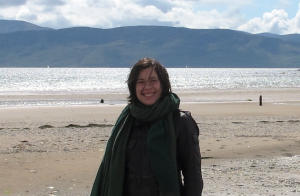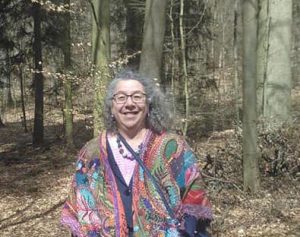
The final meeting of this year’s London-Paris Romanticism Seminar will take place on Friday 18 May and feature an international panel on The Romantic Lecture and Its Institutions. As our guest speakers, we are delighted to welcome Sarah Zimmerman (Fordham University, New York), whose paper is entitled The Romantic Literary Lecture: A Short History, and Judith Thompson (Dalhousie University, Nova Scotia), who will speak on John Thelwall and the Uses of Oratory. Abstracts appear below.
The seminar will be held in Room 349 (3rd floor) at Senate House, University of London, starting at 5.30. The papers will be followed by a discussion and wine reception. Everyone is invited, including postgraduates and members of the public. Admission is free.
 Sarah Zimmerman is Professor of English at Fordham University. She is the author of Romanticism, Lyricism, and History (SUNY, 1999) and, forthcoming with OUP, The Romantic Literary Lecture in Britain. In these studies and in essays on Percy Bysshe Shelley and others, she has focused on the material cultures of lyric poetry and public lectures, with a particular interest in what their historical audiences can tell us about how these media were consumed in their own day. Another recent line of questioning, pursued in essays on Charlotte Smith’s letters and John Clare’s birds-nesting poems, concerns what the period can contribute to a history of private life. She co-founded the Fordham Romanticism Group.
Sarah Zimmerman is Professor of English at Fordham University. She is the author of Romanticism, Lyricism, and History (SUNY, 1999) and, forthcoming with OUP, The Romantic Literary Lecture in Britain. In these studies and in essays on Percy Bysshe Shelley and others, she has focused on the material cultures of lyric poetry and public lectures, with a particular interest in what their historical audiences can tell us about how these media were consumed in their own day. Another recent line of questioning, pursued in essays on Charlotte Smith’s letters and John Clare’s birds-nesting poems, concerns what the period can contribute to a history of private life. She co-founded the Fordham Romanticism Group.
 Judith Thompson is Carnegie Professor of English in the joint faculty of the University of Kings College and Dalhousie University in Halifax, Nova Scotia, Canada. The leading authority on the Romantic-era radical and polymath John Thelwall, she is author of John Thelwall in the Wordsworth Circle: The Silenced Partner (Palgrave Macmillan, 2012) and has edited or coedited several volumes by or about Thelwall, including his early miscellany The Peripatetic, his novel The Daughter of Adoption, his Selected Poetry and Poetics, and a digital archive of his Words and Work (http://wordsandwork.johnthelwall.org). She is the General Secretary and Archivist of the John Thelwall Society and is currently working on the first full biography of Thelwall, tentatively titled Citizen John: A Voice for the Voiceless.
Judith Thompson is Carnegie Professor of English in the joint faculty of the University of Kings College and Dalhousie University in Halifax, Nova Scotia, Canada. The leading authority on the Romantic-era radical and polymath John Thelwall, she is author of John Thelwall in the Wordsworth Circle: The Silenced Partner (Palgrave Macmillan, 2012) and has edited or coedited several volumes by or about Thelwall, including his early miscellany The Peripatetic, his novel The Daughter of Adoption, his Selected Poetry and Poetics, and a digital archive of his Words and Work (http://wordsandwork.johnthelwall.org). She is the General Secretary and Archivist of the John Thelwall Society and is currently working on the first full biography of Thelwall, tentatively titled Citizen John: A Voice for the Voiceless.
ABSTRACTS
The Romantic Literary Lecture: A Short History
By the end of the Regency it was possible to have a public debate about whether or not public lectures were good for poetry or would destroy a love of it. In late 1819 Blackwood’s Edinburgh Magazine condemned these popular events, and in 1822 James Jennings made an impassioned public defense of them at the Surrey Institution using remarkably similar terms. In no way new, the medium of the public lecture was indebted to various oral cultures, but something crystallized in the two decades in which Romantic figures such as Coleridge, Thelwall, Campbell and Hazlitt presented their ground-breaking ideas about literature in lecture form and argued with one another in a way that caught the public’s imagination. Following recent studies, we now have a detailed picture of the Romantic-era lecture scene, but one kind of historical document remains mostly untapped: the lectures themselves. We know them as print works, but as historical performances they have much more to tell us. Using interdisciplinary approaches, I outline a methodology that conceptualizes the challenges of studying historical speaking events and proposes new ways of interpreting them at a distance of two centuries.
Sarah Zimmerman
John Thelwall and the Uses of Oratory
Despite long-term interest in Romantic orality, Romantic oratory—generally defined as the formal art of public speaking—has received little scholarly attention. In this talk I shall introduce various types and forms of oratory in the Romantic period by focusing on the work of John Thelwall, its most notorious political orator, arguably its most successful literary lecturer, and certainly its chief theorist of oratory and elocution. Thelwall defined elocution as at once an art, a science and an act, and I will consider all those meanings; but I will focus on the last in particular, especially as it relates to the idea of “practical fluency” to which Thelwall’s early political lectures were committed. I will use Thelwall’s active, pragmatic and revolutionary concept of the public voice to examine (dis)continuities between political, literary and scientific phases or aspects of his own career and of Romanticism in general. From beginning to end of his career, Thelwall was devoted to the democratic enfranchisement, improvement and education of the English “vox populi,” even as that ideal was complicated, if not compromised, by his own commercial motives and success. Both the ideal, and the success, took institutional form in the school that he operated in London between 1806 and 1821. Drawing on recent research, I shall therefore conclude by briefly considering where Thelwall’s comprehensive, progressive, eccentric pedagogical-therapeutic Institution fits within the history of public education in the Romantic period, including the mainstream institutions with which he competed, and the Mechanics Institutes in whose genesis and operations he was instrumental.
Judith Thompson